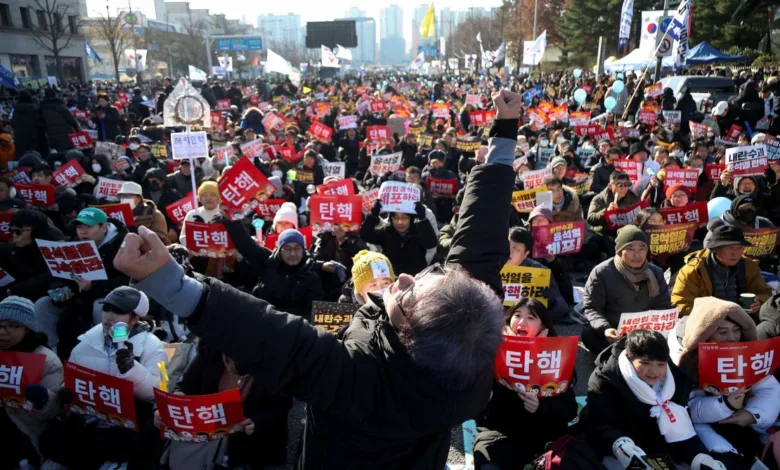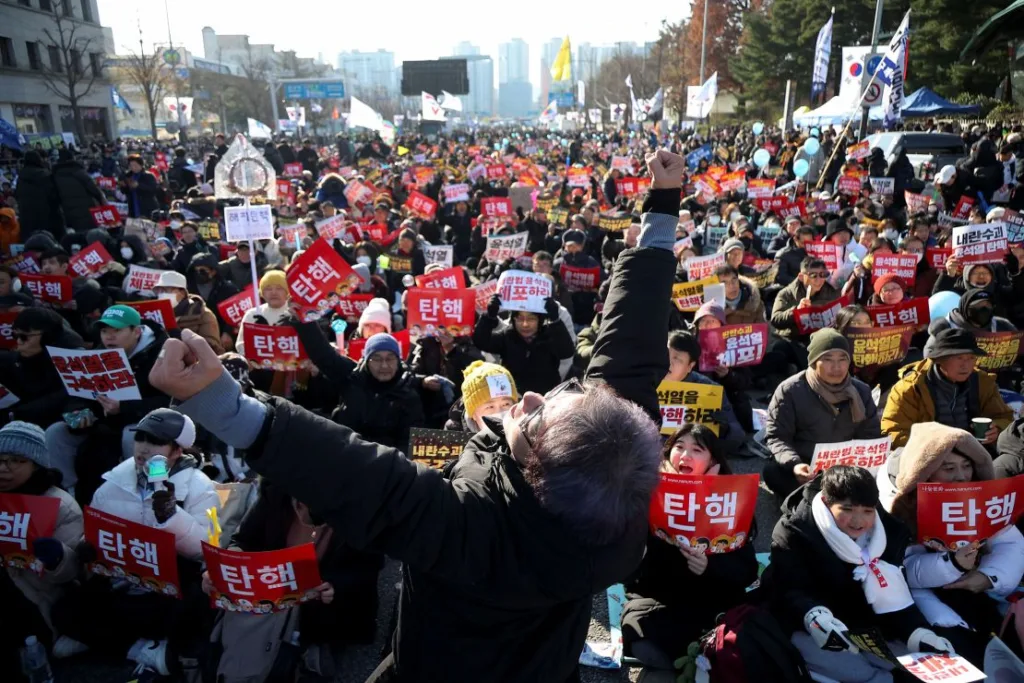South Korea Impeachment Crisis 2024: A Shocking Political Showdown

In an unprecedented move, the South Korea Impeachment Crisis 2024 has captured global attention. President Yoon Suk Yeol faces mounting political turmoil after his controversial declaration of martial law, which led to violent clashes and widespread protests. The political crisis erupted after Yoon’s decision to impose martial law, claiming it was essential for protecting the nation’s constitutional order against threats, including nuclear-armed North Korea. This unexpected and drastic action has sparked a nationwide debate about democracy, governance, and executive overreach.
The Declaration of Martial Law and Its Aftermath
On December 3, 2024, President Yoon declared martial law in response to growing concerns about national security. According to the president, this measure was necessary to counteract pro-North Korean elements and maintain order in the face of increasing regional instability. However, his decision quickly escalated into a full-scale political crisis when troops were dispatched to the National Assembly building in Seoul, forcing their way inside and creating chaos.

The martial law decree, which aimed to limit political activities, restrict media freedoms, and impose censorship, was met with immediate resistance. Lawmakers and the public rejected the move, viewing it as an authoritarian overreach that undermined South Korea’s democratic principles. Protests erupted across the nation, with citizens demanding the resignation of President Yoon and calling for the protection of their civil liberties.
The Impeachment Process and Political Fallout
In the wake of the martial law announcement, opposition parties wasted no time in launching a formal impeachment motion against President Yoon. Six opposition parties in South Korea’s National Assembly submitted a bill to impeach the president, accusing him of illegal actions that violated the constitution. This dramatic political standoff has divided the country, with citizens voicing both support and outrage regarding the president’s drastic actions.
Despite the military backing Yoon’s actions, including efforts to control parliamentary sessions and curb media freedoms, many within the ruling People Power Party have called for a reevaluation of the situation. Tensions have escalated, with some members of Yoon’s party even calling for the resignation of key figures, including the defense minister. The political fallout has led to uncertainty regarding the future of the current administration
The Role of the Military and Civil Unrest
The South Korea Impeachment Crisis 2024 not only involves political figures but also the military, which played a critical role in enforcing martial law. The military’s intervention in the National Assembly and its subsequent standoff with lawmakers raised questions about the balance of power and the potential erosion of democratic norms in South Korea.
The army’s actions were criticized by many as a dangerous precedent for military involvement in politics. The situation led to heated confrontations, with military personnel and parliamentary staff engaging in physical altercations. These violent episodes further fueled the public’s anger, contributing to mass protests and calls for immediate democratic reforms.
Global Reactions and the Impact on South Korea’s International Standing
Internationally, the South Korea Impeachment Crisis 2024 has drawn mixed reactions. While some governments have expressed support for President Yoon’s attempts to secure the nation, others have raised concerns about the potential implications for democracy and human rights in the region. South Korea’s status as a key U.S. ally in East Asia makes this crisis particularly significant in the context of regional security.
World leaders are closely monitoring the developments, recognizing that the outcome of this political struggle could have long-term consequences for South Korea’s internal stability and its relationships with global powers. The nation’s handling of this crisis will likely influence its role in ongoing geopolitical conflicts, particularly with North Korea.
Table of Contents
South Korea Impeachment Crisis 2024: A Shocking Political Showdown
In an unprecedented move, the South Korea Impeachment Crisis 2024 has captured global attention. President Yoon Suk Yeol faces mounting political turmoil after his controversial declaration of martial law, which led to violent clashes and widespread protests. The political crisis erupted after Yoon’s decision to impose martial law, claiming it was essential for protecting the nation’s constitutional order against threats, including nuclear-armed North Korea. This unexpected and drastic action has sparked a nationwide debate about democracy, governance, and executive overreach.
The Declaration of Martial Law and Its Aftermath
On December 3, 2024, President Yoon declared martial law in response to growing concerns about national security. According to the president, this measure was necessary to counteract pro-North Korean elements and maintain order in the face of increasing regional instability. However, his decision quickly escalated into a full-scale political crisis when troops were dispatched to the National Assembly building in Seoul, forcing their way inside and creating chaos.
The martial law decree, which aimed to limit political activities, restrict media freedoms, and impose censorship, was met with immediate resistance. Lawmakers and the public rejected the move, viewing it as an authoritarian overreach that undermined South Korea’s democratic principles. Protests erupted across the nation, with citizens demanding the resignation of President Yoon and calling for the protection of their civil liberties.
The Impeachment Process and Political Fallout
In the wake of the martial law announcement, opposition parties wasted no time in launching a formal impeachment motion against President Yoon. Six opposition parties in South Korea’s National Assembly submitted a bill to impeach the president, accusing him of illegal actions that violated the constitution. This dramatic political standoff has divided the country, with citizens voicing both support and outrage regarding the president’s drastic actions.
Despite the military backing Yoon’s actions, including efforts to control parliamentary sessions and curb media freedoms, many within the ruling People Power Party have called for a reevaluation of the situation. Tensions have escalated, with some members of Yoon’s party even calling for the resignation of key figures, including the defense minister. The political fallout has led to uncertainty regarding the future of the current administration.
The Role of the Military and Civil Unrest
The South Korea Impeachment Crisis 2024 not only involves political figures but also the military, which played a critical role in enforcing martial law. The military’s intervention in the National Assembly and its subsequent standoff with lawmakers raised questions about the balance of power and the potential erosion of democratic norms in South Korea.
The army’s actions were criticized by many as a dangerous precedent for military involvement in politics. The situation led to heated confrontations, with military personnel and parliamentary staff engaging in physical altercations. These violent episodes further fueled the public’s anger, contributing to mass protests and calls for immediate democratic reforms.
Global Reactions and the Impact on South Korea’s International Standing
Internationally, the South Korea Impeachment Crisis 2024 has drawn mixed reactions. While some governments have expressed support for President Yoon’s attempts to secure the nation, others have raised concerns about the potential implications for democracy and human rights in the region. South Korea’s status as a key U.S. ally in East Asia makes this crisis particularly significant in the context of regional security.
World leaders are closely monitoring the developments, recognizing that the outcome of this political struggle could have long-term consequences for South Korea’s internal stability and its relationships with global powers. The nation’s handling of this crisis will likely influence its role in ongoing geopolitical conflicts, particularly with North Korea.
The Path Forward: What’s Next for South Korea?
The South Korea Impeachment Crisis 2024 is far from over. The impeachment motion will be voted on in the coming days, and the outcome of this vote could determine whether President Yoon remains in power or if South Korea undergoes a period of political upheaval.
If the impeachment is successful, it will mark the first time in South Korea’s history that a president is removed from office through this process. However, if the motion fails, it could set the stage for further confrontations and possibly an escalation of protests.
The crisis highlights the ongoing struggle between executive power and democratic checks and balances in South Korea. As the country faces a critical juncture, the world will be watching closely to see how the situation unfolds.
Conclusion: A Nation at a Crossroads
The South Korea Impeachment Crisis 2024 serves as a reminder of the delicate balance between maintaining national security and protecting democratic freedoms. While President Yoon’s decision to impose martial law was made with national security in mind, it has sparked a fierce debate about the limits of presidential power and the importance of safeguarding South Korea’s democratic institutions.
As the political drama unfolds, the eyes of the world remain fixed on South Korea, waiting to see if the nation can find a resolution that respects both its security needs and its commitment to democracy.




